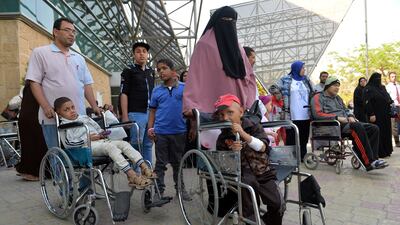A prominent children’s cancer hospital in Cairo is at risk of closing down because of a sharp decline in donations that are needed to keep its 320 beds in use.
The Children's Cancer Hospital Egypt, better known as 57357 — the bank account number through which it receives donations — will most likely be closed in six months if donations do not increase, a member of the hospital’s Board of Trustees told local news outlets on Tuesday.
“Donations have been seriously down during the past few months,” Obada Sarhan said. The hospital used to have several trusts at various banks, but the last was liquidated two days ago, leading to closure concerns, he added.
In August, a second branch of the hospital, which opened in 2015 in Tanta, a city in Egypt’s rural Gharbeya province, was also shut down due to a lack of funds.
It led to outrage from families of the branch’s patients, who at the time plastered calls for help on the walls of the hospital. They also gathered outside the building to call on authorities to step in.
Videos posted on social media in August showed groups of people outside shouting at assembled journalists, saying that many had donated to the hospital to keep it open.
Following two currency devaluations this year, the Egyptian pound has depreciated sharply against the dollar, by between 20 and 25 per cent, which is the main reason why the hospital was now in dire straits, Mr Sarhan said.
A threefold increase in the price of medication and machinery, which are mostly imported, was also behind the closure of 57357’s Tanta branch earlier this year and the transfer of its patients to less specialised university hospitals in Gharbeya, he added.
Mr Sarhan said the hospital’s funds were severely depleted because of Covid-19, when people stopped donating because of financial uncertainty. Opening the Tanta branch also drained the hospital’s funds significantly, he said.
Earlier this year, because of the drop in donations, the hospital reduced the age limit for the monitoring of discharged patients.
Previously, patients, who are all under 18, would be monitored by the hospital after recovery until the age of 25 to ensure their cancer did not return. Earlier this year, the age was dropped to 22.
A number of celebrities issued calls for donations to the hospital on social media, with actor Amr Youssef posting a Facebook Live video asking Egyptians to give what they could to save it.
“The situation is dire, please help them,” Youssef said.
Youssef’s heartfelt call to action was widely shared by several other stars, who said they would be making donations to save the hospital.
Hospital 57357 was a landmark project throughout the early 2000s with a number of large-scale promotion campaigns that many still remember.
First announced in 1998, it opened in 2007.
Ninety per cent of the donations collected to open the hospital came from inside Egypt. The country’s Grand Mufti said it was a legitimate means of paying zakat — the obligatory giving to charity that is one of the five pillars of Islam.
The communal way in which the hospital was funded has brought it close to the hearts of Egyptians.
Hospital 57357 is also one of the largest paediatric oncology centres in the world.


